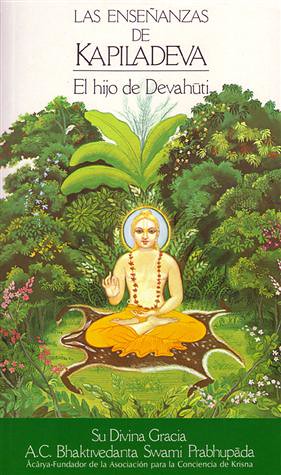Kapiladeva - an avatära of Çré Kåñëa, who appeared as the son of Kardama Muni and Devahüti. He taught the true purport of the säìkhya philosophy to his mother. In this original säìkhya philosophy of Kapiladeva there are twenty-five principles. Beyond these there is the existence of Çré Bhagavän, who is the source of the other principles. There was another Kapila who appeared later in the dynasty of Agni who taught an atheistic version of the säìkhya philosophy (see Kapila above). The atheistic säìkhya accepts the twenty-five principles but denies the existence of God. The säìkhya of Kapiladeva ultimately culminates in bhakti.
Enseñanzas de Kapiladeva
|
El Señor Kapila es un reconocido sabio y el autor del sistema filosófico conocido como Sankhya, que es una importante parte de la herencia filosófica de la antigua India. Traducción y comentarios por A.C. Bhaktivedanta Swami Prabhupada. Descargar en PDF (2.0mb) |
Canto 9 |
|
Chapter 8: The Sons of Sagara Meet Lord Kapiladeva(1) S'rî S'uka said: 'Harita was the son of King Rohita [see previous chapter] and his son Campa built a city called Campâpurî. After him there was Sudeva who also had a son called Vijaya. (2) Bharuka was the son of Vijaya, he had one called Vrika and Vrika had Bâhuka of whom all the land he had was taken away by his enemies so that the king had to enter the forest with his wife. (3) When he had died of old age wanted his queen to die along with him but sage Aurva, who understood that she was pregnant with a son in her womb, forbade it. (4) The co-wives finding out gave her poison with her food, but with the poison was Sagara ['with poison'] born, who became an emperor of great repute. His sons were responsible for the place called Gangâsâgara. (5-6) He didn't kill the antisocial [Tâlajanghas, or tree-people], the ones opposing [the Yavanas, also: invaders like theMuslims and theEuropeans ], the godless [the S'akâs], the ruffians [Haihayas] nor the barbarians [Barbaras]. Instead made he, to the orders of the guru, them appear in odd dresses, shaved clean, wearing mustaches or sometimes tolerated he them as people with loose hair, being half-shaven, without any underwear or not being clad at all. (7) He was to the words of Aurva in yoga with the Supersoul of all vedic knowledge and the enlightened, and with horse sacrifices of worship unto the Lord, the Original Self and Controller. Some day he discovered that the horse that was used for the sacrifice had been stolen by Purandara [Indra , see also 4.19: 17]. (8) The proud sons born from Sumati [a wife of Sagara] then were ordered by their father to turn the entire country up side down to find out where the horse had gone to.(9-10) In the northeastern direction they saw the horse near the âs'rama of Kapila and said: 'Now we know where that horse-thief with his eyes closed lives; kill him, kill him that sinner!' While thus the sixty thousand men of Sagara with their weapons raised approached him, opened the muni at that very moment his eyes. (11) With their minds stolen [by Indra] and in offense with such a great personality [as Kapila see also 3.25-33], self-ignited their bodies instantly and turned they to ashes. (12) It is not the opinion of the saintly to say that the sons of the emperor were thus burnt to ashes by the anger of the muni, for how could with him [Him] as the abode of goodness by whose grace the entire universe is purified, the mode of ignorance dominate and anger rise - how can earthly dust pollute the ether? (13) With him who so thoroughly explained the world analytically [see 3.25-33] and
in this world is there as a boat with which a seeker can cross over the ocean of nescience that in one's mortal existence is so hard to overcome - how can there, with a learned person elevated in transcendence, be a sense of distinction between friend and foe? [such a one is always jubilant: prasannâtmâ] (14) He who born from Kes'inî [Sagara's other wife] was called Asamañjasa had as a prince a son of his own known as Ams'umân who always did the best he could for his grandfather. (15-16) Formerly a yogi, as he could remember from another life, had Asamañjasa fallen down from the path of yoga because of bad association and personally proven himself a most disturbing way. Behaving badly was he of trouble for everybody in the society and had he, sporting with his relatives, been acting unkind throwing all the boys into the river the Sarayû. (17) Of these acts [the boys had disappeared] was he by his father banned who gave up his love for him. By the power of yoga [though] managed he to present the boys and went he away. (18) O King, the inhabitants of Ayodhyâ were astound to see their sons turning up again while the king was truly sorry [now that his son was gone]. (19) Ams'umân ordered by the king to search for the horse went for it following the tracks his uncles had left behind and found the horse near a pile of ashes. (20) Seeing the one from the beyond [theVishnu avatâra] known as Kapila, offered the great personality attentively prayers with folded hands prostrating himself.
(21) Ams'umân said: 'No one of usliving beings can envision You as the Transcendental One. To the day of today can not even LordBrahmâ fathom You and by what meditation or guesswork would others, we creatures of thematerial world who, taking the body for the self, miss the transcendence [see also B.G. 7: 27]? (22) They who accepted a material body under the influence of the three modes [the gunas, see also B.G. 14: 5] can only see those modes so one says and bewildered by the illusory energy not know You who resides in goodness in the core of the heart of one's body; they see but the external byproducts. (23) By Sanandana and other worshipable sages free from the contaminating and bewildering illusory differentiation caused by the gunas, is all wisdom with the original nature [svabhâva] rolled in one [see B.G. 14: 26 & 2: 45], but how can I as a fool of matter keep You, the Personality [of that unity], in mind? (24) O Peaceful One, I offer my obeisances unto You, the Original Supreme Personality, who without a name and form, transcendental to the temporal and eternal, in order to distribute the transcendental knowledge, to the modes of matter has assumed a material body symptomized by fruitive action. (25) In their hearth and home, accepting Your material energy as the real thing, do they [birth after birth] wander around in this world in their hearts bewildered by lust, greed, envy and illusion. (26) O Supreme Lord, by simply seeing You has today this hard and tight knot of our illusion been broken of which one in one's sensuality is influenced by lust and the profitmind, o Soul of All beings!'
(27) S'rî S'uka said: 'O master of man, the great sage and Supreme Lord Kapila this way having been glorfied, told Ams'umân mercifully the following about the path of knowledge. (28) The Supreme Lord said: 'Take this horse, my son, it is the sacrificial animal of your grandfather, but all these bodies of your forefathers burnt to ashes can by no other means be saved but by Ganges-water.' (29) After circumambulating him bowing to his satisfaction brought he the horse back to Sagara and was by means of that animal the concluding ceremony performed. (30) Following the path laid out by Aurva handed he [Sagara], freed from attachments and desires, the kingdom over to Ams'umân and attained he the supreme destination.'
Second edition, loaded December 15 2007
Página PRINCIPAL
OBRAS y AUTORES CLÁSICOS
Agradecimientos
Cuadro General
Disculpen las Molestias
| Conceptos Hinduistas (1428)SC |
|---|
Category:Hindu (mythology) (3256)SC | Category:Hindu mythology (3270)SC | Categoría:Mitología hindú (3288)SC (indice) | Categoría:Mitología hindú (videos) (3289)SC | Conceptos Hinduista (A - G) SK y SC (videos) (3294)SC Aa-Anc · Aga - Ahy · Ai - Akshay · Akshe - Amshum · Ana - Ancie · Ang - Asvayu · Ata - Az · Baa-Baz · Be-Bhak · Bhal-Bu · C · Daa-Daz · De · Dha-Dry · Du-Dy · E · F · Gaa-Gayu · Ge-Gy · Ha-He · Hi-Hy · I · J · K · Ka - Kam · Kan - Khatu · Ki - Ko · Kr - Ku · L · M · N · O · P · R · S · Saa-San · Sap-Shy · Si-Sy · Ta - Te · U · V · Ve-Vy · Y · Z |
| Conceptos Hinduistas (2919)SK | (2592)SK |
|---|
Aa-Ag · Ah-Am · Ana-Anc · And-Anu · Ap-Ar · As-Ax · Ay-Az · Baa-Baq · Bar-Baz · Be-Bhak · Bhal-Bhy · Bo-Bu · Bra · Brh-Bry · Bu-Bz · Caa-Caq · Car-Cay · Ce-Cha · Che-Chi · Cho-Chu · Ci-Cn · Co-Cy · Daa-Dan · Dar-Day · De · Dha-Dny · Do-Dy · Ea-Eo · Ep-Ez · Faa-Fy · Gaa-Gaq · Gar-Gaz · Ge-Gn · Go · Gra-Gy · Haa-Haq · Har-Haz · He-Hindk · Hindu-Histo · Ho-Hy · Ia-Iq · Ir-Is · It-Iy · Jaa-Jaq · Jar-Jay · Je-Jn · Jo-Jy · Kaa-Kaq · Kar-Kaz · Ke-Kh · Ko · Kr · Ku - Kz · Laa-Laq · Lar-Lay · Le-Ln · Lo-Ly · Maa-Mag · Mah · Mai-Maj · Mak-Maq · Mar-Maz · Mb-Mn · Mo-Mz · Naa-Naq · Nar-Naz · Nb-Nn · No-Nz · Oa-Oz · Paa-Paq · Par-Paz · Pe-Ph · Po-Py · Raa-Raq · Rar-Raz · Re-Rn · Ro-Ry · Saa-Sam · San-Sar · Sas-Sg · Sha-Shy · Sia-Sil · Sim-Sn · So - Sq · Sr - St · Su-Sz · Taa-Taq · Tar-Tay · Te-Tn · To-Ty · Ua-Uq · Ur-Us · Vaa-Vaq · Var-Vaz · Ve · Vi-Vn · Vo-Vy · Waa-Wi · Wo-Wy · Yaa-Yav · Ye-Yiy · Yo-Yu · Zaa-Zy |






No hay comentarios:
Publicar un comentario